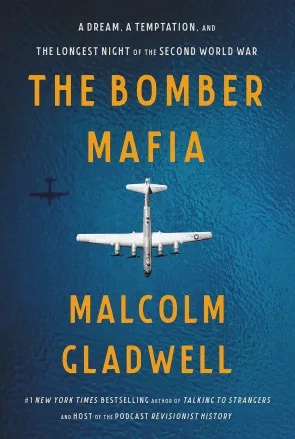Not my usual fare for this blog as it’s historical non-fiction, but this book made me reexamine my thinking vis-à-vis our conduct of the air war in Europe and Japan during WWII.
Between The War to End all Wars (WWI) and our second global conflagration, a group of pilots tried to reimagine war. The wholesale slaughter of soldiers on both sides of the conflict because of the invention of the machine gun, improved explosives, mustard gas, etc., was horrific to everyone. The airplane only played a small role and mostly for observation.
The continued advance of technology led Army Air Corps leaders like Hap Arnold and Haywood Hansell to believe that the size and speed of bombers, flying at high altitude with things like the Norden Bombsight would enable the Allies to precisely drop bombs – “into a pickle barrel.” Thus, the Allies could target only the war-making capability of the Axis. Thereby allowing the Allies to wage a more moral war.
It didn’t work – at least not outside of laboratory conditions. Weather, flak, enemy aircraft, and, bizarrely, the jet stream, all made the Norden essentially no better than a guess. Raids against Schweinfurt cost the Army Air Corps 60 B-17s and 550+ men – 25% of the force on the minimally-effective raid – in one day.
The RAAF preferred night bombing of places that didn’t require precision, such as cities. Hoping to destroy the morale of the Germans. When it was pointed out that bombing London hadn’t destroyed British morale, they said, essentially, “Yeah, but we’re different.”
In the Pacific theater, the US switched to night incendiary bombing and to targeting Japanese cities because the weather in Japan wasn’t much different than the weather in Europe and because the B-29 could fly high enough to hit the previously unknown1 jet stream. General Curtis LeMay believed it was worth the moral cost because an invasion would take years.
I always believed that the atomic bomb was what ended the war in Japan. Gladwell doesn’t think so. He thinks that the destruction of 65ish cities by napalm resulted in not only more deaths, but also more horrific deaths.
The book revealed a large hole in my understanding of the air war and generated a lot of thoughts about what the most moral course would have been.
The Bomber Mafia is a good book that started life as an audio book and is probably better in that format. Overall, an 8.
- In the 20s – 1920s – a Japanese meteorologist had discovered the jet stream. Unfortunately for most of the world, he chose to publish his paper in Esperanto, a constructed language that few spoke then or now.

